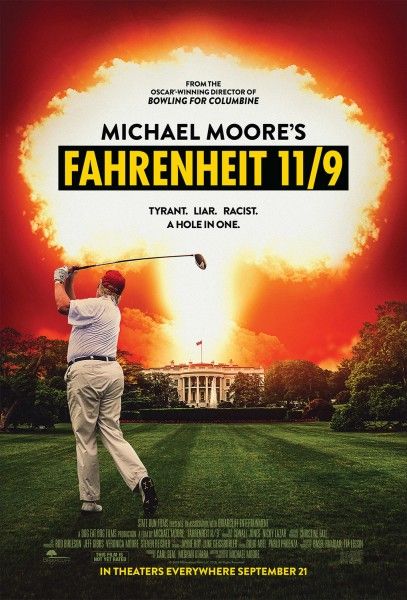The key to watching a Michael Moore documentary is to understand it as agitprop. Like a good filmmaker, he knows how to elicit an emotional response, and he wants to use that emotional response as motivation. But like a bad political activist, he has no idea how to work towards the change he seeks. His newest movie, Fahrenheit 11/9, highlights Moore’s best and worst tendencies as a filmmaker, and the film’s strongest aspects are constantly undermined by its weakest parts. Somewhere in Fahrenheit 11/9, there’s a great documentary about the Flint Water Crisis and the need to tear down the political system that caused it. But Moore fails to make a cohesive argument, trying to link every major event in America back to a sick and bloated political class, yet with few answers on how to affect change other than a nebulous idea about political revolution.
“How the fuck did this happen?” Moore asks at the beginning of the movie about the election of Donald Trump as President. The movie then jumps around a lot as it tries to dissect Trump, look at his manipulation of the media, tie that media to a corrupt political system where Democrats compromise too much, and Republicans never compromise in endangering the lives of American citizens. This eventually takes Moore back to his hometown of Flint, Michigan and explaining the water crisis that poisoned an American city. The movie then moves towards more hopeful avenues, looking at the young progressive candidates disrupting the Democratic party and the Parkland survivors who have taken to organizing. And then the movie returns to Trump and warning of fascism that will only be stopped, not by hope, but by action.
That call to action is the central irony of Fahrenheit 11/. It’s surprisingly hopeful in looking ahead at future generations and young politicians like Alexandria Ocasio-Cortez who want to push the country further to the left, where the majority of Americans already are on a number of issues like healthcare, immigration, and the military. And yet, the people most likely to see a Michael Moore documentary are people who are already politically engaged. Moore is right to note that the shift that needs to happen isn’t Conservative to Liberal or targeting swing voters but moving non-voters to voters. He blames the lack of turnout in 2016 to a weak candidate and a turncoat Democratic party, but if you felt like the stakes were low enough in 2016 to skip voting, are you going to take time out to see a Michael Moore documentary that’s over two hours long?
The desire to get non-voters to become voters is the most concrete action Moore can support because he’s not about details, or if he is, he doesn’t care to really share them with his audience. For Moore, it’s all about getting an emotional response, and sometimes he does that exceedingly well. You can’t help but laugh at the dark comedy of the slowly deflating energy at Hillary Clinton’s victory party that never was or be deeply disgusted by the relationship between Donald Trump and his daughter Ivanka. Do these things tell us anything about America or how to fix it? Not really, but they draw you in and give you an emotional response that Moore hopes to use to further his arguments about corrupt establishments like the media and Washington politicians.
I don’t expect a documentary filmmaker to “solve” anything, but he or she should at least create a better educated audience rather than a better entertained one, but Moore always goes for entertainment first in the hopes that it will serve his political ends. If you walk into Fahrenheit 11/9, you know you’re going to get a course in how conservatives are evil, Democrats are spineless, and if we just embraced progressive values, the bad things would go away. The kicker here is that I share Moore’s progressive values and I support progressive ideas, but I think his answer of “political revolution” is childish and simple. It’s one thing to show young candidates knocking on doors and talking about how they’ll fight people in the streets for a better America, but those candidates have also probably done the research on what matters to their constituents and learned about the issues. And if they haven’t, then Moore is just propagating ignorance that serves liberal values rather than a better-informed representative democracy. Movies like Fahrenheit 11/9 don’t make citizens any wiser or smarter, but they do get them to nod in agreement, which seems kind of pointless.
There’s absolutely a place right now for smart, incisive documentaries that provide a close-up on the flaws in America. Moore wants to cover all of those flaws, do it in two hours, and not give any issue the full attention it deserves. Watching Fahrenheit 11/9, I couldn’t help but wonder how the time would be better spent educating an audience rather than wasting time on a scene where Moore, in a typical stunt, takes a pair of handcuffs to make a citizen’s arrest of Michigan governor Rick Snyder. Yes, scumbags like Rick Snyder typically get away with doing horrible things to their citizens, and the point that Moore is making is that it will take a serious political movement to get rid of Snyder and his ilk. But that’s going to take serious people with thoughtful answers, and all Moore knows how to do is to get a laugh or a gasp out of his audience.
Rating: C




